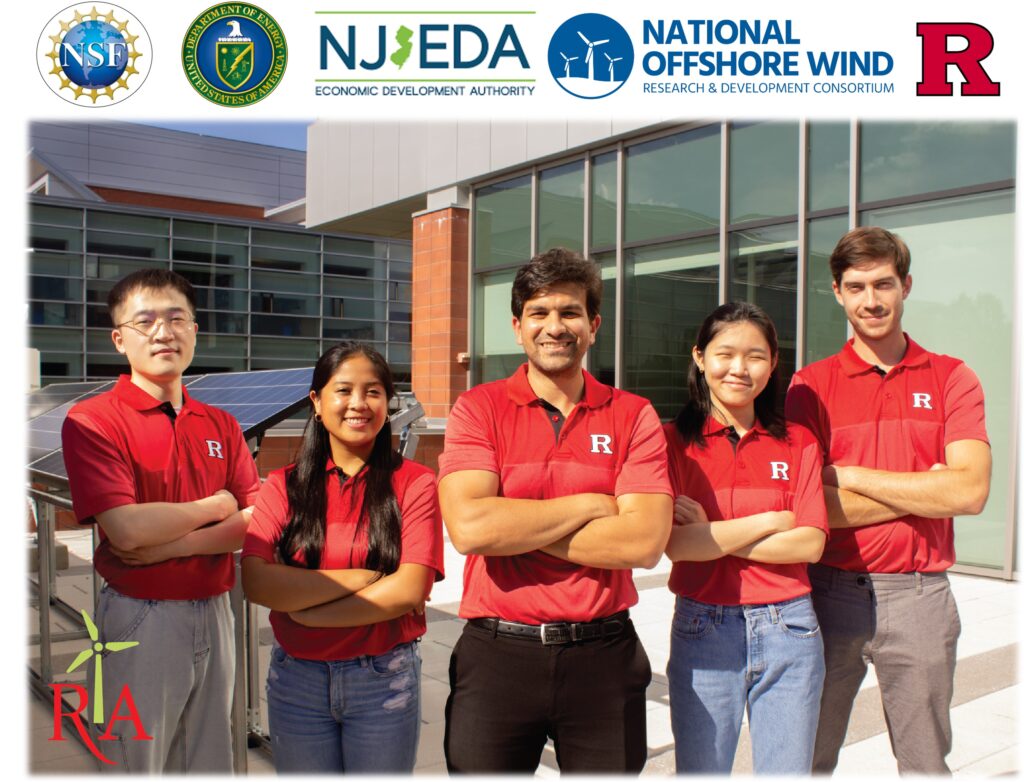Research
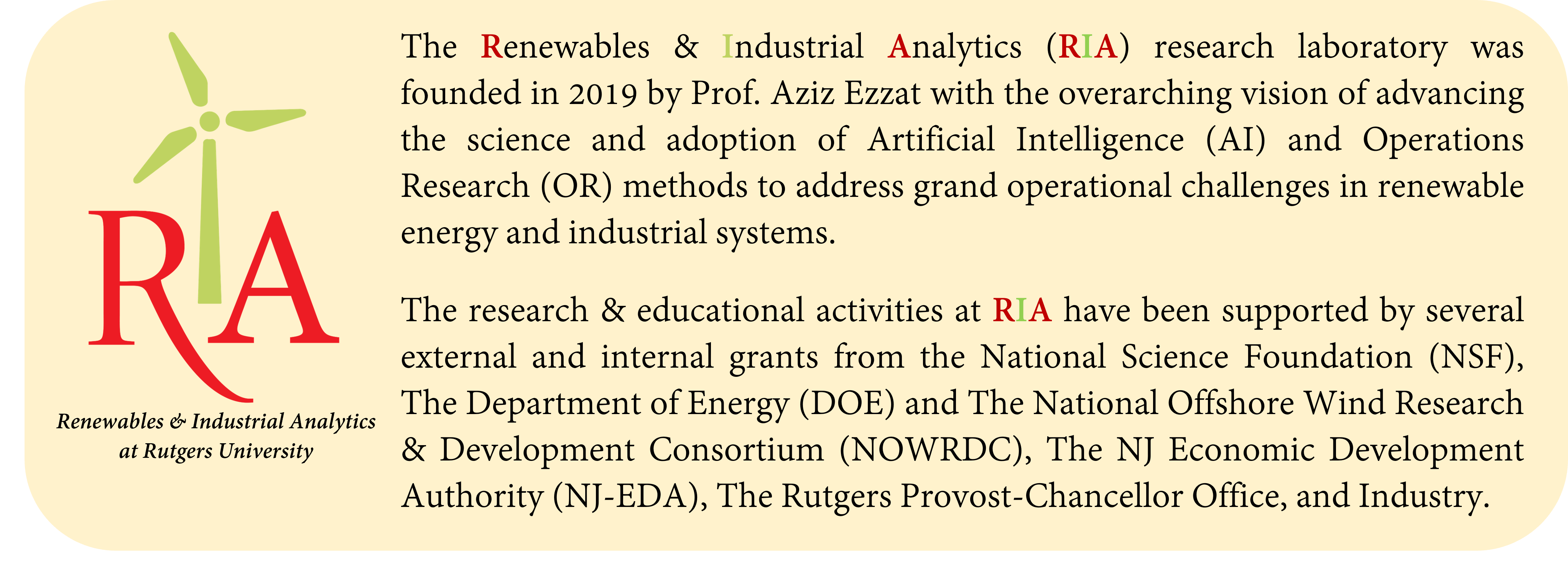
(I) Research Area #1: Renewable Energy Operation:
At RIA, we seek innovative solutions rooted in Artificial Intelligence (AI) and Operations Research (OR) to re-envision and improve the operation of renewable energy systems, with the ultimate vision of enhancing the economic outlook of renewable energy, and enabling their cost-effective and reliable integration into electrical power systems. Three overarching thrusts, (T1-T3), are pursued:
(T1) AI-based Energy Forecasting: The reliable operation of renewable energy systems largely relies on accurate forecasts of the local weather conditions and generation levels at the asset-, plant-, and system-levels. We design, develop, and test AI models that can fuse multi-fidelity data (e.g., local observations, SCADA data, numerical weather models) in order to probabilistically forecast renewable energy generation at a multitude of spatial and time scales.
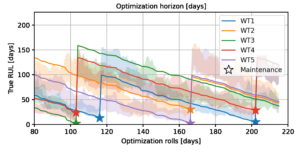
(T2) AI/OR for Operations & Maintenance (O&M): O&M activities contribute a significant portion of the cost of energy of renewables. We design, develop, and test AI/OR-based solutions to (i) timely detect and predict systematic changes and anomalies in the performance of renewable energy assets (i.e., performance monitoring, diagnostics, and prognostics); and (ii) optimally identify when/where/how to commit maintenance resources and/or adjust asset- and plant- production levels to improve key O&M metrics (e.g., cost, downtime, utilization).
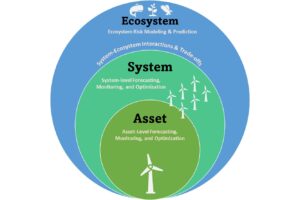
(T3) AI/OR for Good: Responsible Operation of Renewable Energy Systems: The development and operation of renewable energy systems often entails unique trade-offs that arise due to the interaction of renewable energy assets with their surrounding ecosystems. We spearhead the design and development of AI/OR methods that can maximize the co-existence of renewable energy systems with their exogenous environment, so as to achieve a sensible balance between system-level objectives (e.g., cost, reliability, production) and their eco-system counterparts (e.g., minimize ecological disruption), thereby enhancing the acceptance of renewable energy developments by policy-makers, local communities, and the general public, while creating a new and positive frontier for AI/OR innovation (i.e., AI/OR for Good).
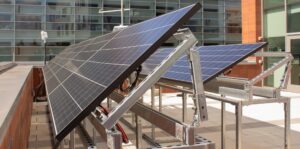 From a broader perspective, our research thrusts in T1-T3 are well-aligned with the regional and national milestones for renewable energy integration (e.g. NJ Clean Energy; DOE Wind Vision; Biden-Harris Offshore Wind Goal), as well as the global effort towards climate change mitigation and adaptation (e.g. Paris Agreement). Earlier in 2018, Dr. Aziz Ezzat gave a brief overview on how data science can help wind energy, available on YouTube at: Wind Energy: A New Solution To a 5000 Year Old Problem. Complementary to the methodological thrusts pursued in the lab, Dr. Aziz Ezzat oversees the RIA solar testbed (See our facilities here), located in Richard Weeks Hall of Engineering. The fully digitized testbed has been set up by Dr. Aziz Ezzat since 2020, and has been undergoing continuous upgrades since, with the main purpose of propelling the research and education of AI/OR applications in renewable energy systems.
From a broader perspective, our research thrusts in T1-T3 are well-aligned with the regional and national milestones for renewable energy integration (e.g. NJ Clean Energy; DOE Wind Vision; Biden-Harris Offshore Wind Goal), as well as the global effort towards climate change mitigation and adaptation (e.g. Paris Agreement). Earlier in 2018, Dr. Aziz Ezzat gave a brief overview on how data science can help wind energy, available on YouTube at: Wind Energy: A New Solution To a 5000 Year Old Problem. Complementary to the methodological thrusts pursued in the lab, Dr. Aziz Ezzat oversees the RIA solar testbed (See our facilities here), located in Richard Weeks Hall of Engineering. The fully digitized testbed has been set up by Dr. Aziz Ezzat since 2020, and has been undergoing continuous upgrades since, with the main purpose of propelling the research and education of AI/OR applications in renewable energy systems.
(II) Research Area #2: Industrial/Materials Informatics:
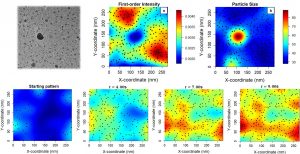
The advancements in sensing and computational technologies and capabilities in industrial and materials engineering systems have created a golden opportunity to re-envision the design and operation of those systems through the lens of AI/OR. Data from those systems are often high-dimensional, unstructured, noisy, and are sampled at multiple resolutions. At RIA, we seek data-driven answers to lingering scientific questions that are difficult to tackle solely using physics (or physics-based models) by constructing ML-based tests of hypotheses and interpretable AI models that can be used to (i) discover hidden and complex patterns, correlations and interactions, (ii) identify their interconnection with the driving physical phenomena, and (iii) translate this physical knowledge into surrogate models that are computationally efficient, and more importantly, that can be used to produce on-the-fly probabilistic simulations or predictions that can complement physics-based models and/or refine empirical laws and theories derived from physical understanding.
(III) Methodological Interests (for Both Areas #1 and #2):
In pursuit of the above two overarching thrusts, our research group builds on the theory and application of spatio-temporal data science, operations research, reliability and quality science/engineering, and probabilistic modeling.
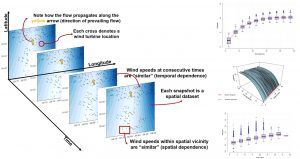
Specifically, we have developed interest in the analysis and modeling of spatio-temporal data, i.e., data which exhibit variations and dependencies across time (i.e. time-series data), space (i.e. variation over multiple locations), or both, i.e. space-time. Undoubtedly, we live in a world that is inherently spatio-temporal and is naturally clouded with uncertainty. Spatio-temporal data science offers a methodical framework to make probabilistic inference and predictions about a stochastic physical process given data sampled over space and time. Spatio-temporal data arise in a myriad of engineering/physical applications either in the form of geostatistical data, or point process data.
(IV) Other Applications related to Industrial & Systems Engineering:
Motivated by our training and affiliation in Industrial Engineering, we are also interested in problems related to quality and reliability engineering, engineering diagnostics/prognostics, fault discovery and anomaly detection, and statistical process monitoring in industrial and engineering applications.
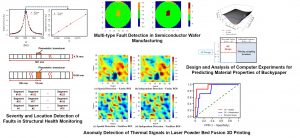
(V) Research Funding (since 2019):
The methodological development and applications of Dr. Aziz Ezzat are well-funded by several federal, state, and industrial sources. Between 2019-2023, Dr. Aziz Ezzat has won several external and internal grants as a PI or co-PI with the total funding of ~$1.4M (His personal share is ~$1.03M).
The RIA lab is grateful for the support of the U.S. National Science Foundation (NSF), The National Offshore Wind Research & Development Consortium (NOWRDC) and Department of Energy (DOE), New Jersey Economic Development Authority (NJ-EDA), Institute of International Forecasters (IIF) and SAS Corporation, 4AI Inc., Cognite Inc., Rutgers Provost-Chancellor Office, Rutgers Energy Institute, Rutgers Global Office, Rutgers Research Council Grants.
